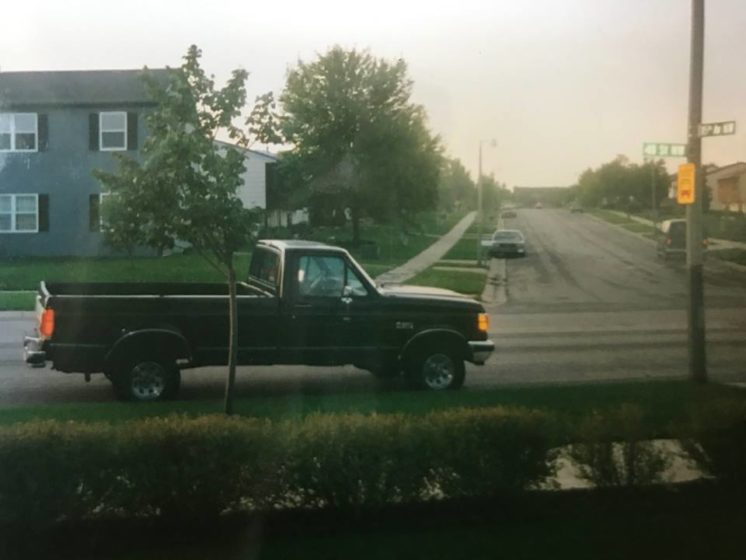Against Wise Advice
 When I let the brown-leather Wilson basketball fly — when I ended a slow three-or-four-step run-up more elegantly than you might expect from an oafish 6’2”, 210-lb., 21-year-old boy-man by lightly springing off my left foot, driving my right knee up and out, and launching the ball into its arc with two hands — I wasn’t sure it was going to go in.
When I let the brown-leather Wilson basketball fly — when I ended a slow three-or-four-step run-up more elegantly than you might expect from an oafish 6’2”, 210-lb., 21-year-old boy-man by lightly springing off my left foot, driving my right knee up and out, and launching the ball into its arc with two hands — I wasn’t sure it was going to go in.
I’d taken a lot of half-court shots since my teens: before and after 10th-grade practice at Rochester John Marshall High; while skipping class to play noon ball in Romano Gym with my UMD football buddies; alone, ill-equipped for identifying anything better to do, just shooting around on various playground or gym courts. Sometimes you know, from the moment it leaves your hand, what’s going to happen. Muscle and brain memory and senses I don’t know how to name tell you everything from how you planted your foot to how your fingertips were in relationship with the ball’s seams to which snippet of which song was looping through your head add up to a swish, brick, or something else.
But in that moment in November 1993, in the College of St. Scholastica gym at halftime of a Saints’ women’s game against an opponent I can’t remember, when I sprung off my left foot from just behind the royal-blue half-court stripe laid on blonde hardwood, I didn’t know what the ball was going to do. At least I don’t think I knew. Honestly, I never know what I know or knew. I’ve been admonished a few times recently (with both warmth and contempt) for wantonly admitting what and when I don’t know. For expressing uncertainty and self-doubt and regret instead of [long pause] whatever other state of mind it would be more attractive and credible — and more comfortable to other people — for me to claim. For asking annoying questions about obvious and hypocritical contradictions.
It’s OK. I’m accustomed to it. When someone on Facebook tells me to stop wearing a hairshirt of “ostentatious self-punishment” and start behaving intelligently, it feels exactly the way it felt when my fifth-grade teacher chastised me for asking in front of the class why it was OK for her to search students’ desks for missing library books while everyone was at recess. She told me I was a problem. So did a lot of other teachers. So have a lot of other people. I am accustomed to being told I am a problem. It’s OK. I probably am.
But um, back to the lecture at hand: the ball went in.
I had bought a small handful of $1 tickets from a couple students selling them at a card table near the concessions stand before the game. Lots of people were buying them. At halftime, someone in charge of running the contest would draw one of the tickets and read its number over the public-address system. The person who had the matching ticket would get to participate in a shooting contest. If they made two layups, a free-throw, a three-pointer, and a half-court shot within 30 seconds, they would win $4,500. I remember this for sure: I knew I was going to be called. From the moment I bought the ticket to just before the number was read, I knew I would be the person participating in the contest. I was so certain about it that I wondered if everyone else with a ticket could tell I’d be the one. I don’t recall ever feeling so sure about something. I don’t know if I willed it into being or what, but my number got called.
I made my way from the bleachers to center court. Someone with a cordless microphone and the ball was out there with me. They explained the rules: I had to start at center court; I could take the shots in any order and as many times as I needed; I had to make one layup from each side of the basket; the free-throw had to be from the actual free-throw line; the three-pointer could be from anywhere outside that line, as could the half-court shot; stepping on or over the free-throw, three-point, or half-court lines would render a made shot moot. Did I understand? I did. OK. Here’s the ball. Once the person with the mic got back to the scorer’s table they’d give me a 5, 4, 3, 2, 1, then the 30-second clock would start.
I don’t remember feeling nervous. I was never a good basketball player but I was often a decent shooter, and I somehow just thought of the whole thing as shooting around for a little while. I’d done it hundreds of times. I started with a half-court attempt and knew enough to keep running after letting it go, which meant I was there to collect the soft-right rebound and put the ball in for one of my layups. Then I made the left layup. Then the free-throw. Then the three-pointer. I had something like 15 seconds left. I loped out to center court again.
Later that night Ms. LaCount (now my wife and then my girlfriend), who was on the St. Scholastica team that was in its locker room while all this was going on, told me a friend of hers in the stands said something like, “I mean . . . he wasn’t moving real fast. He’s not fast.” I wasn’t. I’m not. I’ve always made up for not being super-strong by being pretty slow.
I took a second or two to relax then sent a high, soft shot toward the hoop. The higher and softer the ball arcs, the better chance it’s got to go in. It missed. I don’t remember how — don’t know if it just glanced off the front of the rim and fell straight down, hit the backboard hard, ricocheted jaggedly to one side, or what. I just know that wherever it went I calmly collected it, dribbled back to half-court, readied myself again, shot, and made it.
I think I actually celebrated demonstratively for a second or two. Ran a few steps toward the basket with my arms in the air, maybe? Not much more than that. No fist-pumping or anything ridiculous. I might have smiled. I was less disciplined then than I am now and sometimes, like if I won a bunch of money, I couldn’t help letting a grin show. It’s so disappointing to think about. The crowd went as wild as a couple hundred people can go. Ms. LaCount later said that when the eruption reached the locker room the coach stopped his exhortation mid-sentence and he and everyone else looked toward the gym and at each other trying to figure out what was going on.
Turns out the coach was kind of pissed. The contest had been his idea. Selling tickets for the contest was supposed to be a fundraiser for some aspect of something, maybe a trip, the team was doing. He didn’t expect anyone to win, but (and I may be mis-remembering some parts of this) in order for it to be legal and legit he had to guarantee a winner would actually get paid, and since the money didn’t actually exist in an account he took out an insurance policy that would kick in if some jackass like me actually won. If I recall correctly, he more-than-subtly suggested that if I were a decent dude I’d do him a solid and just let the whole thing drop. I wasn’t an assertive young man, but I politely declined that suggestion and withstood his irritation, correctly deeming the problem his, not mine.
I think the elapsed time from sinking the shot to getting a check for the post-tax amount was something like two months. Possibly three. I have a clear memory of standing in the living room at 607 East Ninth Street while someone from the liable insurance company grilled me over the phone as if I were trying to get money for frivolous elective medical treatment. I almost cracked. Almost just gave up. I was easy to manipulate and intimidate. I disliked confrontation. Nevertheless I persisted. Eventually a check showed up.
Not long after winning the money I got a job writing sports for the Mesabi Daily News. During my last quarter of college, from just after Thanksgiving 1993 until early March 1994, I took my final UMD class (Media Law, got a C-) four afternoons a week. After class I’d drive my chintzy, reliable little Isuzu Trooper II to Virginia, get my assignments for the night, drive to Ely or Chisholm or Hoyt Lakes for a basketball or hockey game, head back to write my story and lay out the section, then head back to Duluth by like 12:30. I hated the job immediately and it showed. I wanted to be a writer, not a reporter, and definitely not the person who had to make decisions about which stories to run or where to put them in relation to each other and the ads in the allotted space. It could have been a good opportunity to build experience and credibility. I did not use it that way.
I knew I wanted to use my windfall for a new truck. That was partially because the winter of ’93-’94 was one of the coldest I remember — we put the paper to bed three or four hours early at least two nights that December and January because air temperatures were approaching -50 and the bosses didn’t want delivery drivers out as late as they normally would be — and the Trooper was not great in those conditions. Its ignition switch would freeze in temperatures below zero, and the only way I could turn the thing on was to go through a process of heating the key with a Bic lighter, sticking it in as far as it would go, pulling it out and re-heating it, and doing that over and over until enough heat had transferred from the key to the switch innards to free them up. (Yes, I tried a lot of other things.) Also: there was a hole under the dash, somewhere down by my left foot, that let in unimpeded cold air, which wasn’t a huge deal while driving around town but became a bit miserable at highway speeds. Some expanding foam could have taken care of it. I didn’t know about expanding foam or much else back then.
And it was partially because I just have never been as wise with money as I would prefer to be. I come from people who are shrewd about their financial business. They tried to teach me. It didn’t take. Buying a vehicle at that time in my life is far from the worst fiscal decision I’ve ever made, but I definitely could have used the money differently. I didn’t need a truck. I wanted one badly.
I looked at a bunch of pickups and SUVs on the Range and in Duluth. I agonized, as I still do, over details consequential and not. Dad found The One for me at a Zumbro Falls dealership where a friend of his and Mom’s worked: a chocolate-brown 1989 Ford F150 XLT Lariat regular cab, super-clean with something like 52,000 miles on it. Straight-six 300. Four-wheel drive with manual hubs. Manual transmission. I’m not a motorhead, but I’ve never had more affection for a mechanical possession than I had for that truck. I miss it so much. I won’t be able to explain why I loved it or what that love really feels like, so this whole essay, which is sort of supposed to be about that feeling, is kind of a stupid idea.
It’s something about the way I felt while sitting in it. Its proportions fit mine. It was simple and solid. Cozy. Stout. Big without being ludicrous. Late one early-spring 1994 afternoon, as I was driving the truck west on MN 169 toward some sports event in Chisholm, the sun was setting in a way that created those crazy gradients of color that ascend from orange through reds and purples into a blue so vivid it looks like it can’t really exist. A perfect reflection of that sky was laid out on the truck’s expansive hood. The experience moved me. I’ve tried to describe it many times since then. This may be the last time, because it never works the way I want it to. It’s not my first memory of alpenglow-type light moving me past tears and into an emotion I have no words for. (The first time was a few years earlier, sitting on the western shore of a BWCA lake and watching dying sunlight make white-pine tops fiery orange on the eastern side.) It is the formative experience with that light that I most often and wistfully recall. It was a perfect moment. I feel lucky to have had it.
I once gave Mayor Gary Doty a ride in the truck, as part of a janky little job I had after quitting the newspaper. One of its hub covers was loose and I’d forgotten to tighten it before picking him up at City Hall. It clanged every time the wheel went around. We didn’t know each other. He was cranky. “What’s that sound?” he snapped. I explained it. He was unimpressed that I hadn’t taken care of it. The look he gave me conveyed something like, “Why would anyone do that?” Then he snapped at me for turning left from Fifth Avenue West onto Superior Street. “You’re not supposed to do that.” That was all in the first 90 seconds. The rest of the ride took another 20 minutes.
The second winter I had the truck, I drove a bunch of guys to go sledding on a perfectly snowy night. I weighed about 210 and I was maybe the lightest among the three guys in the cab and the four or five in the back. As we turned from College onto Woodland, headed toward Seven Bridges Road, I glanced in the rearview mirror and saw a lovely silhouette of one of the guys in the box tipping back a bottle of Hot 100. After we were done I had to drop a couple fellas off at Stadium Apartments. I’d gotten into the specious habit of taking slow, snowy corners by goosing the gas in a way that would sort of swing the truck’s ass end around just right. It was fun in a 23-year-old-boy sort of way. It worked well when the box was empty and light. I tried it in the Stadium lot. It turned out to work poorly with 800 or 900 pounds of dude in the back. Instead of making the turn and looking cool I rammed a car. Didn’t do a lot of damage, but definitely did enough to matter. The guys in the cab gave me a, “What the hell were you thinking?” glance then said, “Get outta here! Go!” The guys in the back getting dropped off jumped out and said the same thing. I stopped, wrote a note about what happened, and left it under the car’s driver’s side wiper blade. They looked at me like I was an idiot.
A few months later, after playing in a bar-league softball game, I pulled up for an obligatory beer at our sponsor, the Rustic Bar. While parallel parking, I ever-so-gently kissed the left rear quarter-panel of a beat-up Cutlass with the right edge of my front bumper. I saw what I thought was a scratch. I thought about how I’d feel if someone did that to my truck and didn’t tell me. When I got into the bar I asked the bartender if she knew whose car it was. She did, and the woman and I went out to look at it. She was cool about it. “It doesn’t look too bad,” she said. “My brother does body work. Let me talk to him.” I gave her my info. Three days later she called and said, “Yeah. Uh. Well, my old man checked it out and it looks like you cracked my header. It’s gonna cost 800 bucks. You need to pay us.”
I was gullible. I wasn’t that gullible. I also wasn’t savvy or tough. I got my insurance company involved. After two parked-car “collisions” in a year, my agent politely invited me not to be covered by her anymore. I shopped for new coverage. A liability-only policy was going to cost way more than full coverage had cost before The Incidents. For some reason the thought of minimal coverage on what was still a pretty nice truck felt horrific to me. I’d just started grad school. I envisioned a dystopian future where I would inevitably damage the truck without being able to afford repairs, and a once-handsome vehicle would become a sad old snaggletoothed jalopy. Against wise advice, I sold it. I ignored a lot of good advice in my teens and 20s. I was too arrogant and too scared to really accept help from people who saw I needed it and were trying to provide it. I must have been beyond exasperating. I have been a problem.
The man and woman from Proctor who bought the truck were really nice. We agreed to meet at the Coppertop church. I drove there with my bicycle in the box. I got there a few minutes before they did. The parking lot was empty. I felt fairly sad and it must have shown because after they got there and we’d exchanged pleasantries for a moment or two, the guy’s voice got soft and he looked me in the eye and said, “Are you really sure you want to do this? It seems like you’re going to miss it.” I tried not to watch as they drove away.
Recommended Links:
Leave a Comment
Only registered members can post a comment , Login / Register Here















No Comments